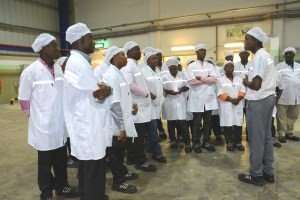
Accra, April 26, GNA - The Grains Quality Improvement Project (GQIP) of Nestlé Ghana, as at 2014, trained more than 65,000 farmers in the north, to ensure high quality and reduce the level of mycotoxins in grains and legumes.
The training, which is ongoing, is aimed at enhancing the quality and quantity of cereals produced, and ensure that farmers meet the strict quality requirements of Nestle in the production of their cereal products, mostly consumed by infants.
Speaking to journalists who toured Nestle's factory to familiarise themselves with the processes of company's products, Mr Aarion Fenu, Corporate Affairs Manager of Nestle Ghana, said the GQIP, which was launched in 2007, is working in collaboration with the Grains Improvement Project of the Ministry of Food and Agriculture to source local crops including maize, millet and rice for the production of 'Cerelac'.
The training he explained has also helped farmers in addressing the issues of aflatoxin, which is a big problem in Ghana years ago, resulting in having more than 50 per cent of maize being rejected.
'Currently, we have less than two per cent of maize now being rejected and that is a significant achievement,' he said.
Nestle, is currently working with the Grains Improvement Project of the Ministry of Food and Agriculture to help farmers in the north to improve on the maize production to reduce the rate of aflatoxin, which could cause cancer if consumed for a long period.
Mr Afenu said Nestle Ghana Limited is committed to producing quality products under hygienic conditions for its consumers.
He pledged the Company's continuous support in maintaining its high quality standards, adding: 'At Nestle we do not compromise on safety and quality.'
Mr Walid Hobeika, Factory Manager, said the company sources 100 per cent raw materials of cereals locally in order to help rural communities to increase their income, and reduce the level of mycotoxins in grains and legumes.
He said the factory has staff strength of 700 with more than 90 per cent of them being Ghanaians.
'We want to help develop the local talent of the people that is why we give more opportunity to the Ghanaian workers.'
The journalists were taken through the total value chain of production, including the cereal plants, beverages and evaporated milk plants and also introduced to some of the latest food processing technologies employed at the factory.
Nestlé Ghana Limited started business in Ghana in 1957 under the trading name of Nestlé Products (Gh) Limited with the importation of Nestlé products such as milk and chocolates.
In 1968, it was incorporated as Food Specialties (Gh) Limited to manufacture and market locally well-known Nestlé brands.
The company became Nestlé Ghana Limited in 1987. In 1971 the production of the IDEAL Milk and MILO started at the Tema Factory.
The factory has since been developed and now also produces Carnation Milk, Ideal, Chocolim, Chocomilo, Cerevita, Cerelac, Milo Cereal and Nescafé 3 in 1. These products are not only produced for Ghana but also exported across West Africa.
In 2003, Nestlé Ghana Ltd invested in a new warehouse, the Central Distribution centre, located next to the factory in Tema. The company also runs sales offices with warehouses in Kumasi, Takoradi, Koforidua and Tamale.
The business activity of Nestlé Ghana Ltd is a direct contribution to the Ghanaian economy. For all these and other endeavours, Nestlé Ghana Ltd has been recognised by Government and other bodies as a responsible citizen.
GNA




 Meta releases new version of conversational AI across its platforms
Meta releases new version of conversational AI across its platforms
 Cape Town named Africa’s Best Airport 2024 by Skytrax
Cape Town named Africa’s Best Airport 2024 by Skytrax
 Bono East: Four injured after hearse transporting corpse crashes into a truck
Bono East: Four injured after hearse transporting corpse crashes into a truck
 ‘Be courageous, find your voice to defend our democracy’ — Sam Jonah urges journ...
‘Be courageous, find your voice to defend our democracy’ — Sam Jonah urges journ...
 Exodus of doctors, nurses and teachers have worsened because of unserious Akufo-...
Exodus of doctors, nurses and teachers have worsened because of unserious Akufo-...
 2024 election: Avoid insults, cutting down people in search of power – National ...
2024 election: Avoid insults, cutting down people in search of power – National ...
 ‘You passed through the back door but congratulations’ — Atubiga on Prof Jane Na...
‘You passed through the back door but congratulations’ — Atubiga on Prof Jane Na...
 Government’s $21.1 billion added to the stock of public debt has been spent judi...
Government’s $21.1 billion added to the stock of public debt has been spent judi...
 Akufo-Addo will soon relocate Mahama’s Ridge Hospital to Kumasi for recommission...
Akufo-Addo will soon relocate Mahama’s Ridge Hospital to Kumasi for recommission...
 We must not compromise on our defence of national interest; this is the time to ...
We must not compromise on our defence of national interest; this is the time to ...
